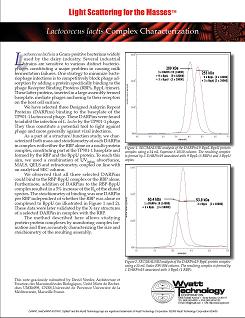Channels
Special Offers & Promotions
Wyatt Technology Instrumentation Used Against Bacteriophage Infections in Dairy Production
 Wyatt Technology Corporation, the world leader in absolute macromolecular characterization instrumentation and software, has been chosen by the Biological Macromolecules Joint Research Unit of the Université de Provence and Université de la Méditerranée in Marseille, France, for its instruments to characterize lactococcus lactis in order to eliminate bacteriophage infections in dairy production. Bacteriophages are obligate intracellular parasites that multiply inside bacteria, infecting them and causing failures of the milk fermentation process. Wyatt's innovative instruments facilitate the study of protein-protein complexes, identifying their potential to serve as inhibitors of bacteriophage infections.
Wyatt Technology Corporation, the world leader in absolute macromolecular characterization instrumentation and software, has been chosen by the Biological Macromolecules Joint Research Unit of the Université de Provence and Université de la Méditerranée in Marseille, France, for its instruments to characterize lactococcus lactis in order to eliminate bacteriophage infections in dairy production. Bacteriophages are obligate intracellular parasites that multiply inside bacteria, infecting them and causing failures of the milk fermentation process. Wyatt's innovative instruments facilitate the study of protein-protein complexes, identifying their potential to serve as inhibitors of bacteriophage infections.
Lactococcus lactis is a Gram-positive bacterium widely used by the dairy industry in the production of yogurt and various cheeses. Several industrial strains are sensitive to distinct virulent bacteriophages, which can infect lactococcus lactis thereby delaying lactic acid production and even stopping the milk fermentation process. As a result, the product's desired properties are altered or entirely lost. The first step in the infection process is the adsorption of the phage to the bacterial cell. One strategy to minimize bacteriophage infections is to competitively block phage adsorption by adding a protein specifically binding to the phage Receptor Binding Proteins (RBPs, BppL trimer). These proteins, inserted in a large assembly termed baseplate, mediate phages anchoring to their receptors on the host cell surface.
The Biological Macromolecules Joint Research Unit selected three Designed Ankyrin Repeat Proteins (DARPins) binding to the baseplate of the lactococcal phage. Both mass and stoichiometry of each DARPin were characterized in complex using a combination of Wyatt's UV 280nm absorbance, Multi-Angle Light Scattering (MALS), Quasi-Elastic Light Scattering (QELS) and refractometry instrumentation, coupled on line with an analytical Size Exclusion Chromatography (SEC) column. The DARPins were found to constitute a potential tool to fight against phage and viral infections in general.
The results of the experiment clearly demonstrated that Wyatt's instrumentation allows the study of protein-protein complexes by monitoring complex formation and then accurately characterizing the size and stoichiometry of the resulting assembly. The instruments' unmatched analytical capabilities are illustrated in a new application note, entitled "Lactococcus lactis Complex Characterization", which is available to download from www.wyatt.com
For more information on Wyatt Technology's instruments or to obtain a copy of the new application note, please visit www.wyatt.comMedia Partners


